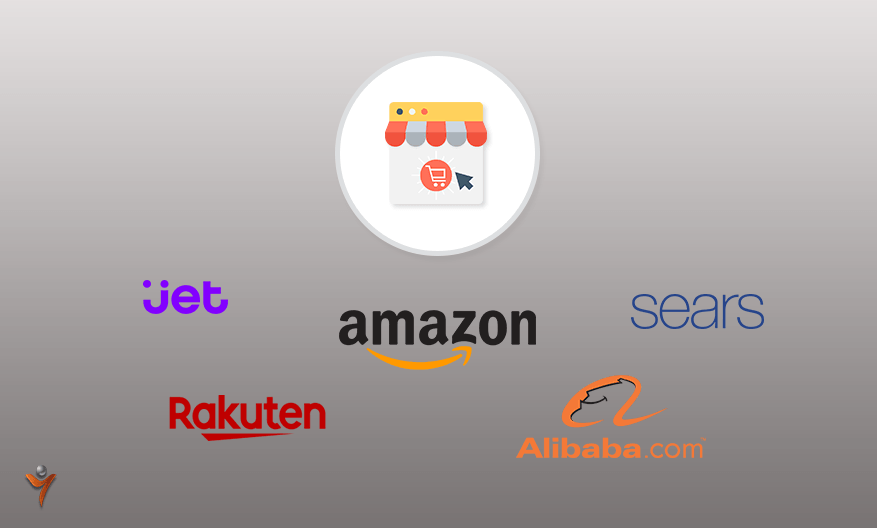So, you’ve decided to start an e-commerce business. We are sure that you are probably thinking, “What to do first?”

How to start e-commerce business. Source: shutterstock.com
First things first, you should decide whether you need a bricks-and-mortar store, or it will be enough to have just a website to sell goods online. Both of these options have “pros” and “cons”, and we’re not here to say that one option is better than another or vice versa. Anyway, it’s up to you. But if you choose the “online option”, you will not have to open a bricks-and-mortar store (at least it will be optional).
In this article, we will talk about the second option — selling goods online.
How to start e-commerce business
The first thing you should do is to find a marketplace. It is a site where you can list your goods or services (as well as information about them) for a customer to see (and hopefully buy as a result).
Let’s consider eBay. It is one of the first and largest online e-commerce marketplaces on the web. EBay is famous for its special sales options, like “buy it now”, auctions or good old-fashioned sales. However, it is not the only place to sell your goods. You can check special marketplaces, such as Etsy or Kickstarter, but really, the internet has lots of places where you can list your goods. These options are good if you need to boost your sales. They work like a modern type of bazaar, where customers search for the items they want. This is where “buy it now” and auctions variants work out.
There is yet another option. You place your goods on the shelf in the big store and wait until people, who visit just happen to run into your product. This scheme is comparable to a small bricks-and-mortar shop that rents a spot in a big mall the same way as a traditional physical shop. Amazon is considered to be one of the best places to work in this way.
But that’s not all. We have prepared some useful tips for merchants, who have just started their journey in the fascinating world of the e-commerce industry:
Choose the right name
First of all, you need to pick a name for your business, but it has to be unique, or at least differentiate you from other merchants and businesses. But before you select a name don’t forget to make sure that somebody has not already taken the name you’d like to be yours. You shouldn’t use a name that is already in use.
Domain name
It would be great if the name you have chosen for your business is the same as the name of the domain of your website (e.g. if you are selling hamsters and have chosen “The Evil Hamster” as the name for your business, it would be amazing if you could call your domain “theevilhamster.com” or something like this). In the case of the domain name being occupied, you can try to pick a close or related name (such as “evilhamsters.com” or “hamstersevil.com” etc, returning to hamster selling), but if that doesn’t work you can choose any other name, just make sure that it is easy to spell and pronounce.
Banking Regulations & Identification number
It’s vital to have your own company’s identification number, that is compliant with the laws of the country (where you are going to run the business). Also, you should open a special company bank account.
Business Licenses and Permits
Before you start to run any business it is essential to find out what operating licenses are required (in the country you’re going to be set up). It is better to double-check that you have them all to avoid any trouble. 
Find the right vendor
In the case you decide to work with a marketplace, you would not need a vendor for goods that you are selling. In almost all other cases you’ll have to work with vendors, and it’s vital to find a reliable one.

General marketplace example
Inventory
Make sure you have all items of your stock in sufficient quantities. It will be a great pity if a customer makes an order for items that you don’t have in stock, or you may have only a few and the quantity is less than the number in the order.
Logistics and Delivery
It is important not only to handle the answer your customer’s questions, but it is also essential to handle the delivery of your supplies as well.
Technology & Software
When it comes to a customer’s shopping experience, one of the main things is to have the right shopping cart plugin (or build your own shopping cart, that works well). You shouldn’t forget about productivity software, like email marketing, CRM, etc.
Marketing
There is a good old proverb – “All is fair in love and war”. The same rule also applies to e-commerce. Use as many digital marketing mediums as you only can. Social networks, blog posts, and many other ways.
Compliance
Remember, even if your business thrives, that is no excuse for forgetting (deliberately or inadvertently) about compliance and reporting to regulators. You shouldn’t ignore any aspect of being a compliant and legal e-commerce site. 
SEO
SEO plays a more important role than you think.
It seems to be pretty self-explanatory. SEO, or search engine optimization, is one of the most important parts of a successful e-commerce business. It’s time to gain a better understanding of the question or hire a professional.
PPC, targeted advertising, behavioural retargeting.
Modern advertising models and mechanisms can yield astonishing results. Don’t be lazy, and find time to read about PPC (pay-per-click), targeted advertising (it’s about reaching the target audience), and behavioural retargeting (targeting to consumers based on their previous Internet actions). A decent advertising campaign, along with a competent SEO analyst can yield considerable benefits.
Trust badges
Trust is the way to convert a visitor into a purchaser. Thus, trust is a crucial factor. Trust badge means a logo from third-party sites. Shoppers feel more comfortable and safe when they see something like “Verified & Secured”, “100% guarantee satisfaction”, or just the VISA/MasterCard/American Express/PayPal badge at the bottom of the screen.

SEE ALSO:









